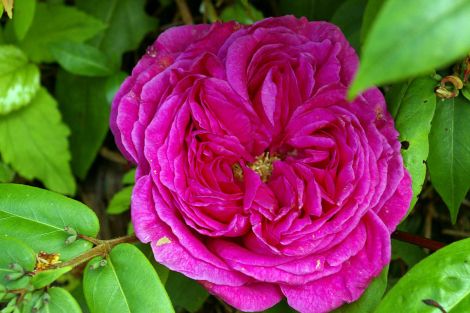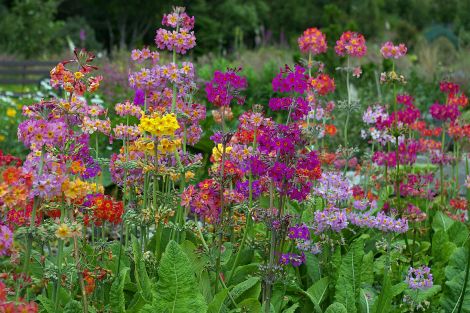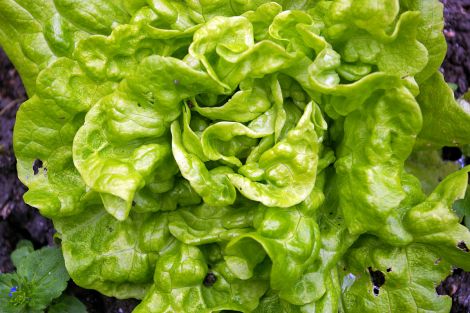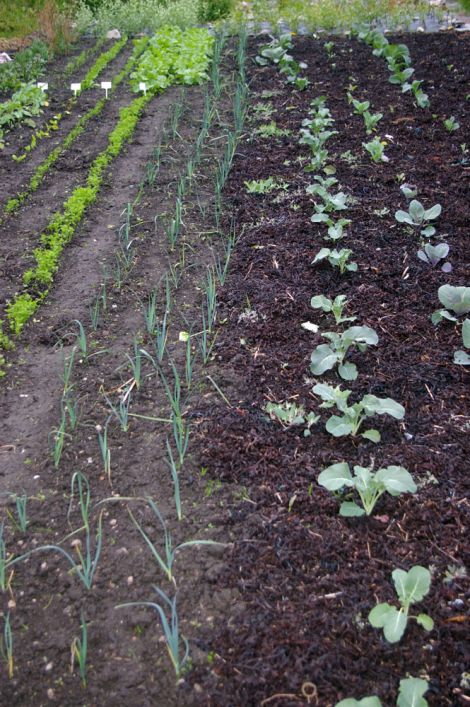Four Seasons / Four Seasons – Early Summer
I’ve just realised that some Shetland gardeners, including myself, have something in common with Marilyn Monroe, or rather her character Sugar Cane in Some Like it Hot. I’m not referring to the platinum blond hair, the legendary curves, the singing and ukulele playing talent, though for all I know, some gardeners may share some or even all of these.
Sugar keeps falling for saxophonists, again, and again, despite those unhappy experiences in her past. They promise her the earth, but are good-for-nothings, don’t repay the money she lends them, and when they invariably leave her, all she’s left with is a squeezed out tube of toothpaste.
Shetland summers are the equivalent of Sugar’s saxophone players. We should know better by now, but each and every year we fall for the promises which are rarely, if ever kept: sunshine, warmth, just a little rain when needed, a stillness of the air most days, no pests or diseases, perfect beds and borders, and produce galore.
We can’t make the weather, but we can influence the micro-climates of our gardens. Shelter is the key to almost everything – except of course – curing hay, where a lack of wind becomes counterproductive.
Inside Lea Garden’s extensive network of shelterbelts and hedging, the average temperature is between 5º and 7º Celsius higher than that measured in the open fields adjoining the garden.
This makes a huge difference to all crops, edible and ornamental, but especially to those trees and shrubs that need higher summer temperatures to ripen their wood and lay down flower buds.
I believe most of us are familiar with the following vegetable scenario: things always get off to a flying start during May and June, but as soon as the first cold snap arrives, all manner of things start to bolt – turnips, carrots, beetroot, parsnips and especially leeks. Some years, as soon as temperatures dropped below the crucial level, my entire leek crop of at least one hundred individuals would start racing towards flowering and setting seed.
Become a member of Shetland News
Doing what nature intends them to do is great for the leeks, but a nightmare for the gardener.
Since shelter has increased, and with it summer temperatures, bolting, while still using exactly the same cultivars, has been reduced dramatically.
More often than not, those northerly airstreams are accompanied by copious amounts of rain and, regardless of how often you Dutch-hoed between your rows of vegetables during the drought of June, new weeds start to grow apace, while those piles of shrivelled ones you left behind miraculously spring back to life.
And then those winged insects start to arrive: cabbage white, cabbage root fly, carrot fly, crane fly.
The present saxophonist turns out to be no different from the one the year before and the year before that. The toothpaste tube is getting squeezed.
The eggs of the cabbage white are easily dealt with, and having several WWOOFing volunteers at Lea Gardens makes spotting and rubbing them out a swift twice-weekly task. Where the tube is being squeezed below ground, things get a little more complicated. Before the gardener notices what’s going on, a lot of damage has already been done.
Despite a thick mulch of seaweed on my brassica patch, those pesky cabbage root flies and daddy long-legs have found a way to lay their eggs, and several plants have started to wilt. As long as they’re not too large, I suggest the following rescue plan: dig them up, remove those revolting little white maggots from what remains of their roots, squish every daddy long-legs in sight, before replanting your brassicas a little deeper and very firmly. Remove some of the larger, outer leaves and keep your fingers crossed.
Carrot fly can be prevented from doing its work by applying a thick mulch of fresh grass clippings around your plants, but the lawn mowings must be clean and free from seed, otherwise you end up with a lawn in your vegetable garden. Organic gardening can be hard work, very time-consuming, but well worth the effort.
It goes without saying that the saxophonist is also known to wreak havoc in the ornamental garden. Wind and rain thrash the borders and what was bolt upright the day before lies sprawling over the path the next. Greenfly sucks the sap from young shoots and tortrix moth caterpillars spin the leaves of shrubs and trees together before riddling them with holes. Black spot has found and disfigured the roses and cuckoo spit festoons the pinks.
There are days when I ask myself: is it all worth it? Why am I going through this every year? Why don’t I just buy my vegetables in the supermarket the way sane people do?
In my heart of hearts I know this isn’t an option. I like my vegetables to taste of something, and I’m certain, as soon as the next saxophonist comes along, I’ve forgotten how tiresome and useless the last one was, and I’m bound to fall for him – hook, line and sinker.
Rosa Steppanova – www.leagardens.co.uk
Become a member of Shetland News
Shetland News is asking its many readers to consider paying for membership to get additional features and services: -
- Remove non-local ads;
- Bookmark posts to read later;
- Exclusive curated weekly newsletter;
- Hide membership messages;
- Comments open for discussion.
If you appreciate what we do and feel strongly about impartial local journalism, then please become a member of Shetland News by either making a single payment, or setting up a monthly, quarterly or yearly subscription.































































